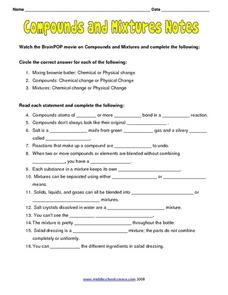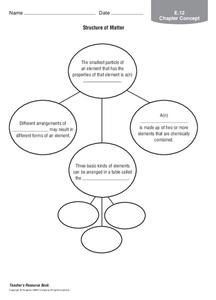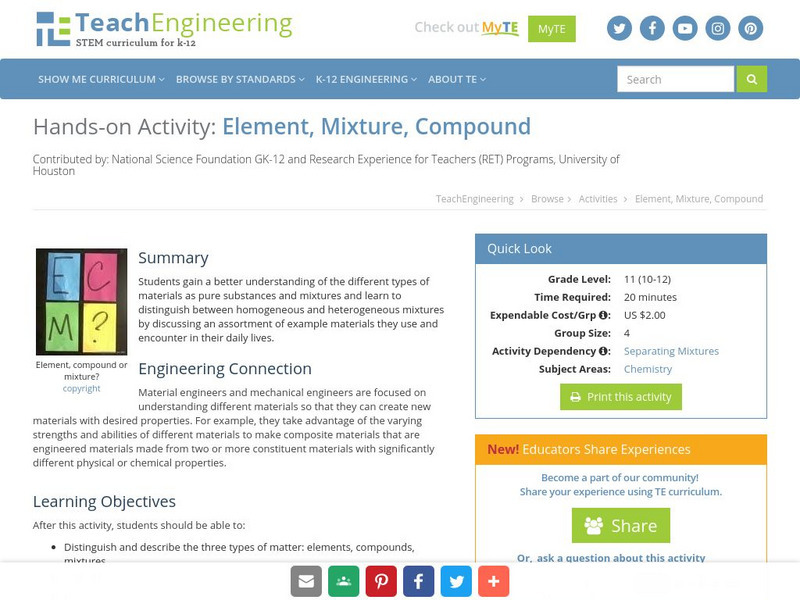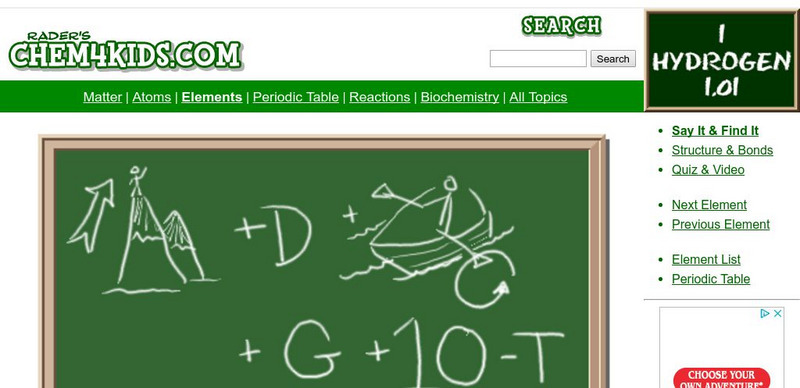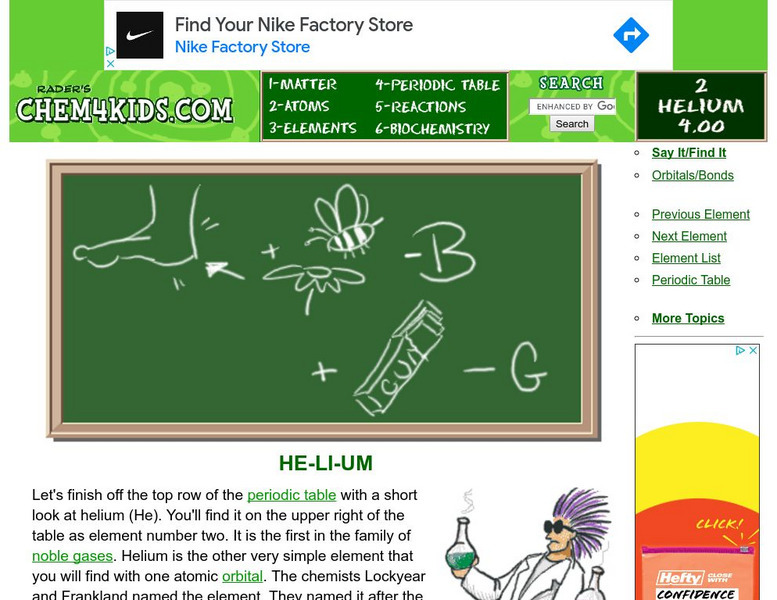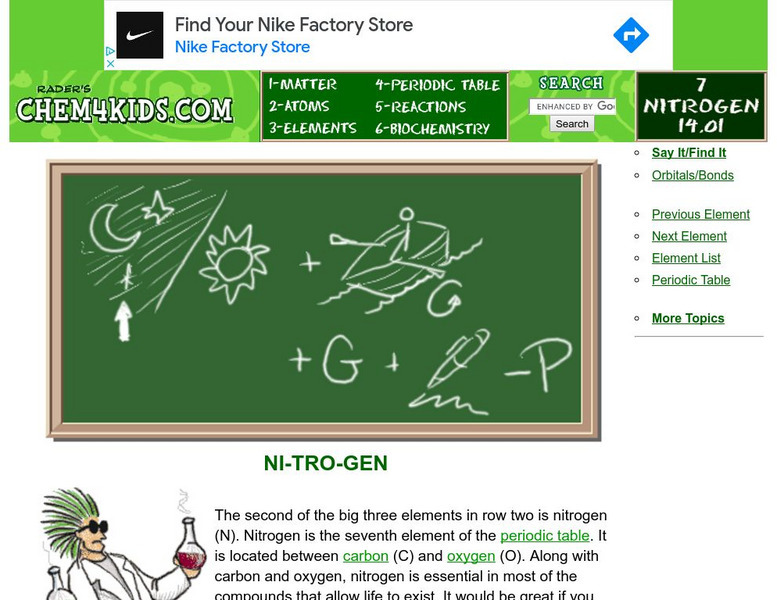Curated OER
Compounds and Mixtures Notes
For this matter worksheet, learners watch a movie and then compare the differences between compounds and mixtures. This worksheet has 16 fill in the blank questions.
Curated OER
Intermolecular Forces
In this compounds activity, students identify the main intermolecular force in the given compounds and explain the differences between dipole-dipole forces and hydrogen bonds. This activity has 5 short answer questions.
Curated OER
Compounds and Molecules
In this compounds activity, students compare separating elements of a compound and substances in a mixture. Students review melting and boiling point. This activity has 1 fill in the blank and 5 short answer questions.
Curated OER
Acid and Base Worksheet
In this acids and bases instructional activity, students apply the Bronsted-Lowry theory of acids and bases to write the products for the given acid-base reactions. This instructional activity has 7 problems to solve.
Curated OER
Combination of Atoms
In this atoms worksheet, students review protons, neutrons, electrons, molecules, compounds, and ions. This worksheet has 10 fill in the blank and 3 problems to solve.
Curated OER
Chemistry Practice
In this chemistry practice worksheet, students select the correct response to the given questions. Students apply knowledge about the states of matter, finding vapor pressure and atmospheric pressure.
Curated OER
Chemistry
In this chemistry worksheet, students classify each chemical compound as a ketone, amine, aldehyde, or ether. Students also write a condensed formula and classification for the given organic products.
Curated OER
Structure of Matter
In this matter worksheet, students review the structure of matter including elements, atoms, and the periodic table. This worksheet is a graphic organizer.
Curated OER
How Does Matter Change?
In this matter activity, learners will fill in the blank of 3 statements that show facts about the changes that can happen to matter. Students will then fill in the blank of 1 conclusion statement.
Curated OER
The Periodic Table of Elements
In this chemistry worksheet, students identify and locate vocabulary terms related to the Periodic Table of Elements. There are 18 words located in the puzzle.
Chiral Publishing
Chiral Publishing: An Introduction to Chemistry: Types of Compounds
Discover different types of compounds such as binary covalent, binary ionic, binary acids, and oxyacids. Explore links that give information about writing names and formulas for different compounds.
Science Education Resource Center at Carleton College
Serc: Lab Investigation Mixture Separation
An inquiry lab where students try to separate as much as the pure substance they can in a set time period. This lab helps students understand that physical means can be used to take apart a mixture.
Oswego City School District
Regents Exam Prep Center: Problems Involving and & Or
This tutorial helps students understand the probability of two events occurring when the words AND & OR are used. There are examples and practice problems. The teacher resource pages include a demonstration and a computer simulation.
The Franklin Institute
Franklin Institute: Introduction to Matter
A resource provided to Grade 8 teachers to address the School District of Philadelphia's Core Curriculum on the topic of Matter. It covers properties and states of matter, elements, compounds, mixtures, atoms, and the periodic table....
TeachEngineering
Teach Engineering: Element, Mixture, Compound
This hands-on activity will help the students have a better understanding of different types of materials as pure substances and mixtures and distinguishes the homogeneous and heterogeneous mixtures by discussing some material they use...
Chem4kids
Chem4 Kids: Hydrogen
Here you can find out about hydrogen, the first element in the periodic table. Content includes shell information, where to find it in nature, and why it is helpful to us.
Chem4kids
Chem4 Kids: Helium
Here you can find lots of great information about helium. Learn about its electrons, where it exists in nature, and about the element itself!
Chem4kids
Chem4 Kids: Beryllium
Here at Chem4Kids you can find some great information about the 4th element in the periodic table, "beryllium." Content focuses on beryllium's electrons, where you can find beryllium in nature, and how beryllium combines with other...
Chem4kids
Chem4 Kids: Carbon
Click on the left navigation terms for some great information about the 6th element in the periodic table, "carbon." Content focuses on carbon's electrons, where you can find carbon in nature and in the home, and how carbon combines with...
Chem4kids
Chem4 Kids: Nitrogen (N)
Here you can find some great information about the 7th element in the periodic table, "nitrogen." Content focuses on nitrogen's electrons, where you can find nitrogen in nature and in the home, and how nitrogen combines with other elements.
Chem4kids
Chem4 Kids: Neon (Ne)
Here you can find some great information about the 10th element in the periodic table, "neon." Content focuses on neon's electrons, where you can find neon in nature and in the home, and how neon combines with other elements.
Chem4kids
Chem4 Kids: Sodium (Na)
Here at Chem4Kids you can find some great information about the 11th element in the periodic table, "sodium." Content focuses on sodium's electrons, where you can find sodium in nature and in the home, and how sodium combines with other...
Chem4kids
Chem4 Kids: Magnesium (Mg)
Here you can find some great information about the 12th element in the periodic table, "magnesium." Content focuses on magnesium's electrons, where you can find magnesium in nature and in the home, and how magnesium combines with other...
Chem4kids
Chem4 Kids: Sulfur (S)
Here you can find some great information about the 16th element in the periodic table, "sulfur." Content focuses on sulfur's electrons, where you can find sulfur in nature and in the home, and how sulfur combines with other elements.


